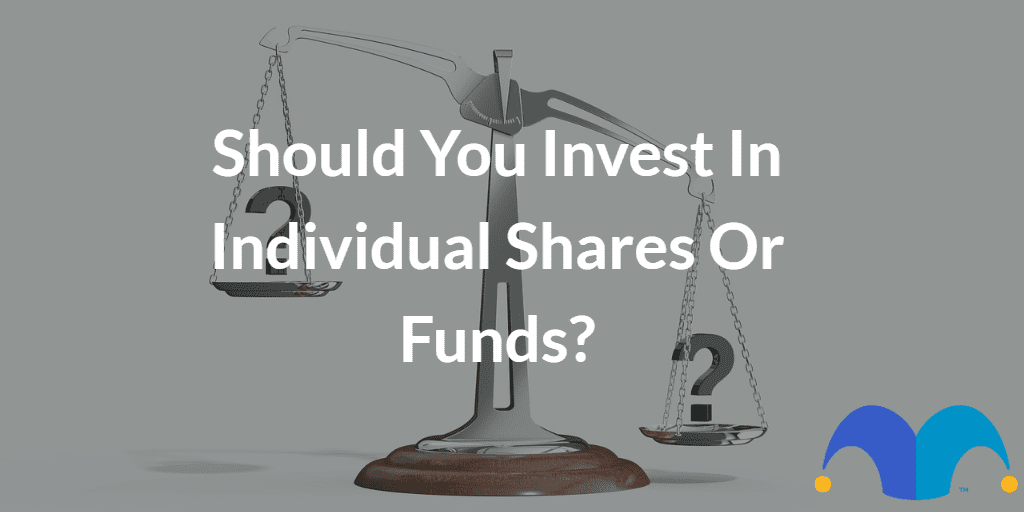You might have already heard that investing in stocks is one of the most dependable ways of creating wealth over the long term. But the stock market can be a relatively complicated arena with lots of different options. One of the decisions you will have to make as an investor is whether to invest in individual shares or in funds.
In this article, we’ll look at the pros and cons of funds vs. shares to help you make the best decision for your circumstances.
What is the difference between funds and shares?
A share is a unit of ownership in a company. If you own a share, you essentially own a little bit of the company and therefore a portion of its overall value. If the company grows and becomes more valuable, your share increases in value too.
A fund, on the other hand, is a pooled investment that contains shares in a collection of companies. Some funds also invest in other assets, such as bonds and property. When you invest in a fund, you basically receive a slice of everything included in the fund.
A fund can be actively or passively managed.
Pros and cons of funds vs. shares
Both shares and funds come with pros and cons to consider. Let’s break them down.
Pros of investing in individual shares
- You have complete control over the choice of companies to invest in.
- There are usually no annual or ongoing fees.
- They offer the potential for more gains depending on your choice of stock.
- They can be tax-efficient since you can control capital gains by timing when to buy and sell.
Cons of investing in individual shares
- Investing in shares carries more risk than investing in funds.
- They are time-intensive and potentially stressful as you have to individually research each company and choose the one that you feel works best for your portfolio.
- You have to hold a number of individual stocks if you want to adequately diversify.
- You will be charged a trading fee for buying or selling.
Pros of investing in funds
- They offer instant diversification. Since you are essentially investing in a basket of assets, your investment is instantly diversified, which minimises the effect of any unexpected losses from individual stocks or assets in your portfolio.
- Professional management is available through actively managed funds.
- Investors can typically avoid trading fees.
- They are convenient and less time-intensive as most of the work is done for you.
Cons of investing in funds
- Many have a minimum investment amount.
- They come with an annual expense ratio (a fee to cover the operating and administrative expenses of the fund).
- They can be less tax-efficient owing to the unpredictable distribution of income and capital gains.
RELATED: Index Trackers vs Managed Funds
Funds vs. shares: 3 questions to determine which to invest in
There is no one-size-fits-all solution here. However, considering the following questions can help you make the best decision for your circumstances.
1. How much risk are you comfortable taking?
If you invest in funds, you will take on less risk as your money will be spread out over a range of different stocks or assets. The trade-off is potentially lower returns.
2. How involved in your investment do you want to be?
If you want to play an active role in choosing your investments, investing in individual shares might be a better option. You’ll get a chance to personally select the companies you invest in.
If you prefer a hands-off approach or don’t have the time, expertise or inclination to select and manage individual shares, then funds are probably a better option as you’ll get to buy many stocks in a single transaction.
3. How much money do you want to invest?
If you have a smaller amount of money to invest, funds might be the better option.
A £1,000 investment in a fund, for example, will buy you a fraction of a diversified portfolio of stock. With individual shares, this amount may only be enough to buy the shares of one company, exposing you to risk if the company underperforms.
Diversify your portfolio with both shares and funds
When it comes to individual shares or funds, you don’t actually have to choose one or the other. If money isn’t an issue, both can be included in your portfolio to help you create wealth and meet your financial goals.
However, as always, do your homework first. Furthermore, only invest an amount that you can commit for the long term, as this is the best way to ride out the stock market’s inevitable short-term fluctuations.
Finally, whether you are investing in individual shares or in funds, consider investing within a stocks and shares ISA. This is a tax-free wrapper that shields your investment gains from tax, meaning that you get to keep more of your money.
Keep in mind that tax rules can change and that tax treatment depends on your individual circumstances.
